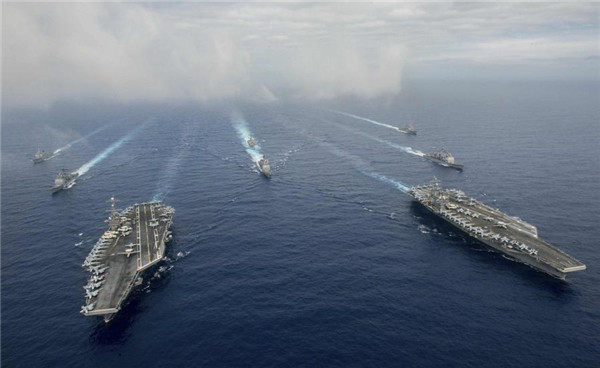 |
|
The Nimitz-class aircraft carriers USS John C. Stennis (CVN 74) and USS Ronald Reagan (CVN 76) conduct dual aircraft carrier strike group operations in the South China Sea on June 18, 2016. [Photo/Agencies] |
At the South China Sea conference at the Center for Strategic and International Studies in Washington on Tuesday, one panel talked about military modernization and capacity building. The talk centered on China's military modernization and how that power might be projected in the South China Sea and how countries in the region should beef up their militaries to counter a possible China threat.
It's not unusual for some in the United States to sound threatened looking at China's military modernization, citing advances from command structure and submarines to bombers and fighter jets. Using the same logic, Chinese should feel even more scared given the unrivalled US military might, whether in terms of weaponry, the more than 1,000 military bases and installations across the world or the constant wars it has been fighting.
Still, that does not mean the National People's Congress, China's top legislature, should approve a 100-percent increase in defense spending to narrow this gap even though the US has been flexing its muscles near China's shores in both the South and East China seas. These include the provocative frequent surveillance by US military vessels and spy planes and the dispatch of aircraft carriers and strategic bombers to the region.
The panel discussion in Washington sounded much like a business promotion for the US military industry, which has increased its sales in Asia dramatically in recent years.
The South China Sea is already highly militarized, crowded with military vessels, jets, bombers and aircraft carriers. Cajoling countries around it into buying more new or outdated US weaponry will make the region more militarized. It certainly does not look like a good way of sustaining peace and stability.
The US rhetoric portrays China as an aggressive nation, yet it has had only a brief border war with Vietnam in 1979 in the past 50 years. Yet it is difficult to tell the last time the US was not fighting a war. Deadly suicide bombings in Iraq, as a result of the 2003 US-led invasion on the false pretext of finding weapons of mass destruction, continue to this day, not to mention the countless Iraqi civilian casualty over the years.
The growing US military presence in the South China Sea has been a source of tension between China and the US. Just on Tuesday, Daniel Kritenbrink, senior director for Asian affairs at the National Security Council, said the US is regularly exercising its own military capacity in the South China Sea.
The panel at the Washington conference, however, did not mention countries there, especially China, should speed up their military modernization and capacity building to tackle the US challenge. World Bank data show that China's military spending accounted for only 2 percent of its GDP in 2015, lower than the world's average of 2.3 percent and much lower than the 3.3 percent by the United States, whose monstrous military budget of some $600 billion in 2015 dwarfed that of the next 10 countries combined.
It would, however, be a bad idea for China to try to catch up with the US in this regard. That money could be far better spent to improve people's livelihoods-for example by building better schools and more hospitals. Countries around the South China Sea, mostly developing nations, share the same urgency to spend more on economic and social development, rather than on importing US weaponry.
Indeed, the US, the largest developed nation, shares no less urgency in investing in infrastructure and school systems but it still prefers to build and sell expensive military jets and other killing machines to other countries because it seems indifferent even to the hardships of its own people.
The author is deputy editor of China Daily USA. chenweihua@chinadailyusa.com